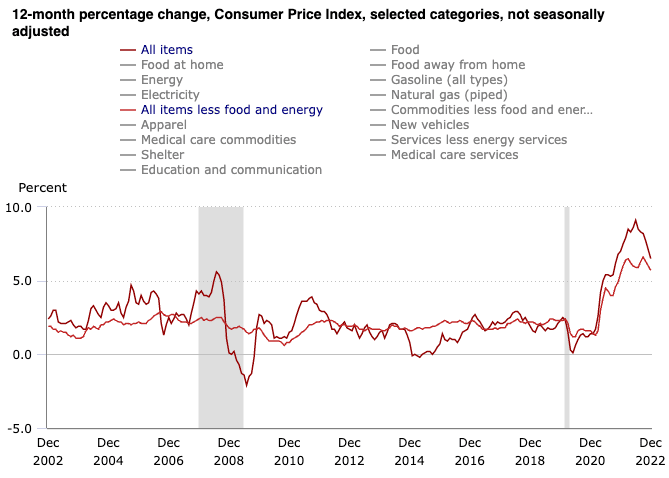GBP/USD Exchange Rate Rallies on U.S. Inflation Release
- Written by: Gary Howes
-

Image © Adobe Images
The Dollar retreated against the Pound and other major currencies after data reaffirmed that U.S. inflation had peaked and was in the process of slowing, keeping alive expectations the Federal Reserve would soon end its interest rate hiking cycle.
Headline U.S. inflation rose 5.7% in the year to December, in line with expectations but down on November's 7.1% as a trend of slowing price rises extended into another month.
"The dollar index sank to fresh seven-month lows after U.S. inflation moderated largely in line with expectation and bolstered the view that Fed borrowing rates may peak below 5%," says Joseph Manimbo, Senior FX Analyst at Convera.
CPI read -0.1% month-on-month in December, down on November's 0.1% and below expectations for 0% as lower gasoline prices made their presence felt.

But it is core inflation that is arguably more important for currency markets as it strips out fuel and food and is more malleable to Federal Reserve policy: core CPI actually rose 0.3% in December, as expected, which is a shift up on November's 0.2% reading.
This was largely driven by an increase in housing costs.
Core CPI in the year to December did however fall to 5.7% from 6.0%, again this was in line with expectations.
"In aggregate prices have been flat now for the last six months, which will be a source of huge relief to the Fed. It will likely lessen the need for many more painful interest rate rises and hence dramatically reduce the risk of the widely-expected US recession," says Hugh Grieves, fund manager of the Premier Miton US Opportunities Fund.
The Dollar was a winner in 2022 when markets priced in an aggressive reaction function in the Federal Reserve to rising inflation, it could therefore be the loser in 2023 as the Fed slows and then halts its interest rate hiking cycle.
The Pound to Dollar exchange rate initially dipped on the data release before recovering and advancing on the day.
At the time of writing, spot is quoted up by two-thirds of a percent at 1.2223, taking bank transfer rates to approximately 1.1979, competitive cash and holiday money quotes to 1.2113 and competitive transfer quotes to 1.2186.
"The Fed will likely be able to pause after a final 50bps hike at the next FOMC," says economist Katherine Judge at CIBC Capital Markets.
But, in a timely intervention, voting member of the Federal Reserve Open Market Committee Patrick Harker said, soon after the release, that it would now be appropriate to raise interest rates by 25 basis point increments going forward.
"The market is priced at 27bps, down from about 32bps before the CPI print. The hawkish Fed view that would encourage renewed USD strength seems further away now," says Derek Halpenny, Head of Research for Global Markets EMEA at MUFG.
"This CPI report makes a downshift by the Fed to a 25 bps hike a little more likely but far from a done deal given such factors as core services ex-housing," says Mohamed A. El-Erian, President of Queens' College at Cambridge University and Advisor to Allianz and Gramercy.
Looking ahead, Ian Shepherdson, Chief Economist at Pantheon Macroeconomics, says U.S. inflation is on a downward trajectory as remaining upside price pressures are due mostly to margin expansion, "a good dose of rents, plus a bit of wages and a bit of energy pass-through."
He says they are all now reversing, "with a long way to go. No further rate hikes are needed."
Recall rents pushed the housing component of core CPI higher? Shepherdson says "don't worry about the big increase in rents; it won't last".
He presents the following chart:
The Dollar sunk sharply and stocks surged when U.S. inflation was shown to have cooled in November's release. The reaction to December's below-consensus figures was similar, but the market reaction was smaller.
Looking at the board, January's market reaction is even more muted, suggesting that the easy market moves on the back of slowing U.S. inflation are behind us.
This could suggest further Dollar declines will be harder fought for.
(If you are looking to protect or boost your international payment budget you could consider securing today's rate for use in the future, or set an order for your ideal rate when it is achieved, more information can be found here.)

